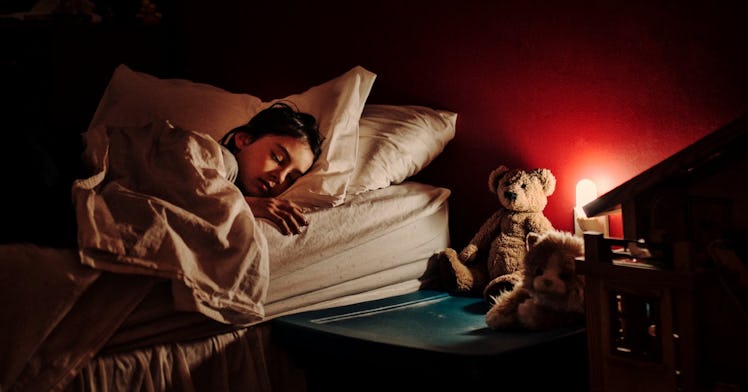That Night Light Is Royally Screwing Up Your Kid’s Sleep, Study Says
Even dim light before bed makes a child's melatonin levels plunge.

Kids’ night lights keep monsters at bay and help fearful children fall asleep…right? Maybe not, research says. Night lights and other sources of even dim light might be making kids sleep worse throughout the night. That’s because even slight exposure to light in the hour before bedtime can cause natural levels of melatonin in preschoolers to decrease significantly.
The recent study, which included 36 healthy children between the ages of 3- and 5-years-old, used wrist monitors to monitor and track light exposure and sleep quality over a nine-day period. Before that period, parents kept the kids on a stable sleep schedule for a week to normalize their body clocks and establish a rhythm where their melatonin levels climbed at a consistent time every night.
“Our previous work showed that one, fairly high intensity of bright light before bedtime dampens melatonin levels by about 90% in young children,” said first author Lauren Hartstein, Ph.D., a postdoctoral fellow in the Sleep and Development Lab at the University of Colorado Boulder, in a statement to the American Association for the Advancement of Science. “With this study, we were very surprised to find high melatonin suppression across all intensities of light, even dim ones.”
Following the control week, the researchers found that melatonin levels were suppressed by between 70% and 90% after light exposure in the evening. And unlike in adults, the change in was not intensity-dependent, meaning even low levels of light elicited dramatic changes in melatonin levels, which remained depressed nearly an hour after the light was turned off for more than half of the children in the study.
Because melatonin regulates the sleep-wake-cycle and gets you into a sleepier state, low levels of melatonin before bed could lead to trouble falling asleep and other sleep difficulties.
The effect is particularly strong on children. Kids’ eyes are physically different from adults’ peepers. Not only are kids’ pupils larger, but their lenses are more transparent. This means kids’ eyes don’t stop the flow of light as well as adults’ do.
Many of the body’s natural rhythms are affected by the amount of light passing through the retina to the brain. Light signals the brain that it should slow or even stop the release of melatonin, making it harder for the body to wind down to a state naturally conducive to sleep.
So what should you do with this information? The bedtime routine for young kids is long enough without trying to brush their teeth in the dark, and turning off the lights for the evening after everyone leaves the dinner table isn’t going to happen. But you should limit screens in the hour leading up to bedtime, and consider dimming the lights as kids are getting ready for bed.
Of course, it’s still possible to foster good sleep without doing away with kids’ night lights and the comfort they provide. But if your kid is having sleep issues, consider doing away with even dim light before bed, and find a new way to fight the monsters.
This article was originally published on